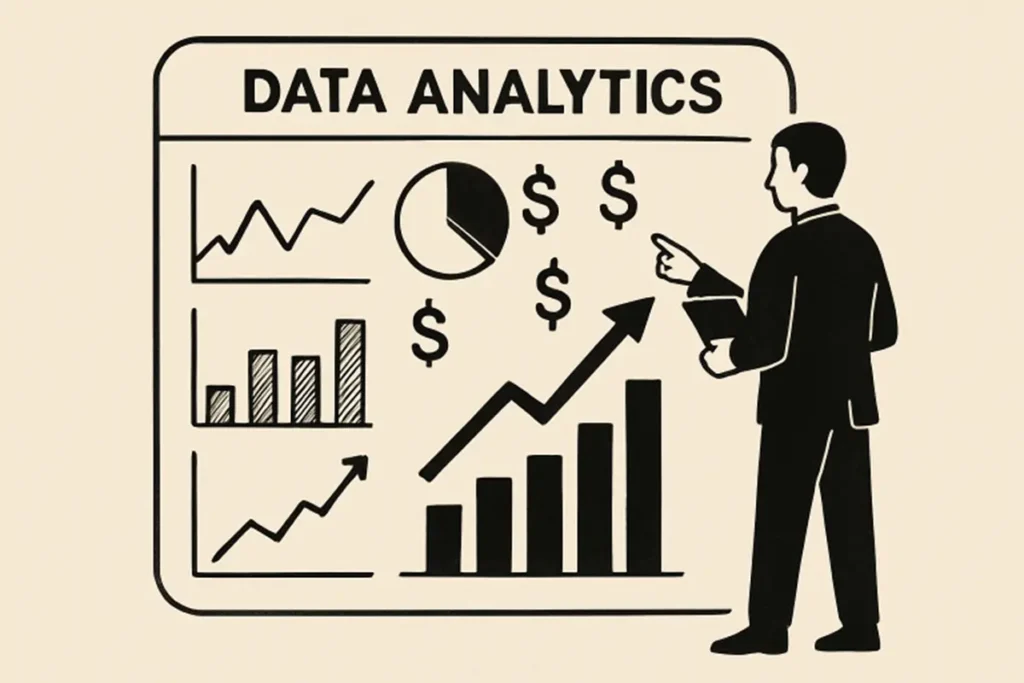Key Takeaways
- Data analytics helps businesses make more confident and informed financial decisions.
- Predictive analytics are becoming crucial for risk management and financial planning.
- Ethical concerns and data privacy remain vital considerations in analytics-driven finance.
- Real-time analytics empower organizations to act swiftly in ever-changing markets.
- Practical examples show that analytics improve expense tracking, fraud detection, and growth forecasting.
Why Data Analytics Matters for Financial Strategy
Modern businesses operate in an environment characterized by rapid technological change and unpredictable market dynamics. Relying solely on traditional methods or intuition is no longer sufficient for organizations looking to thrive. Innovative data analytics solutions are increasingly empowering financial teams to uncover valuable insights hidden within vast datasets, ultimately improving decision-making and resource allocation. For instance, Stratford Analytics economic impact analysis provides companies with detailed insights into how various factors influence their financial performance. Adopting analytics-driven financial strategies enables companies to identify spending patterns, track revenue changes, and capitalize on market opportunities. A Harvard Business Review article shows how data analytics transforms business by informing better decisions, optimizing budgets, and improving forecasting.
Predictive Analytics: Staying Ahead of Risks
The growing complexity of global markets demands that organizations move beyond reactive decision-making. Predictive analytics gives financial professionals the ability to anticipate business risks—such as credit defaults, economic downturns, or liquidity crunches—before they materialize. By analyzing historical and real-time data, organizations can enhance their financial planning, effectively respond to threats, and capitalize on opportunities. Harvard Business Review shows that companies using predictive analytics have better risk management and respond more agilely to market disruptions. These models enhance cash flow forecasts and reduce unexpected losses, boosting resilience.
The Rise of Real-Time Decision-Making
The demand for immediate insights is replacing the traditional cadence of quarterly or annual financial reviews. Today’s organizations use real-time dashboards and analytics platforms to monitor economic indicators—such as revenue, expenses, and operating margins—as they occur. This instant access enables leadership to make quick, informed decisions, adjust spending, and capitalize on opportunities as markets evolve. Real-time analytics provide a competitive edge by identifying bottlenecks faster and reducing financial risks. As digital transformation speeds up, real-time insight is becoming the new standard in financial management.
Ensuring Data Quality and Integrity
The effectiveness of analytics in finance is fundamentally tied to the quality of the underlying data. Inaccurate, incomplete, or inconsistent data can mislead decision-makers and erode confidence in analytical outputs. To combat this, organizations are doubling down on robust data governance strategies—implementing processes such as automated quality validation, frequent data audits, and clear stakeholder reviews.
Prioritizing data integrity not only supports better decision-making but also fosters greater internal trust in analytics-driven strategies. For many leading companies, high data quality serves as the bedrock for innovation and agility.
Balancing Privacy, Ethics, and Analytics
As the collection and use of financial data expands, ethical considerations around data privacy come to the forefront. Adherence to data protection laws, like GDPR and CCPA, is mandatory. However, going beyond compliance—by emphasizing transparency and establishing ethical frameworks for data analysis—can be a key differentiator for companies seeking to earn long-term trust from their customers and partners.
Companies must actively educate their employees on the proper use of data and implement robust controls to safeguard sensitive information. Clear communication around how and why data is used can help organizations maintain compliance and uphold their reputations in the eyes of stakeholders.
Future Trends to Watch in Financial Analytics
Technologies such as artificial intelligence and machine learning are reshaping the landscape of financial analytics. These advancements enable tools such as automated financial advisors, sophisticated scenario modeling, and sentiment analysis, all of which drive more nuanced decision-making. The integration of financial analytics with cloud platforms enables unprecedented agility and scalability, unlocking forecasting and scenario planning capabilities at a scale previously unattainable.
Forward-thinking organizations that remain open to emerging analytics tools—while continuing to refine their data practices—will be best positioned to stay ahead of market trends and rapidly adapt to economic shifts.
Getting Started: First Steps for Organizations
- Clearly define the business objectives or challenges you want analytics to solve.
- Conduct a thorough assessment of your current data sources and identify gaps in collection or management.
- Invest in accessible, user-friendly analytics platforms and offer foundational training for relevant staff.
- Pilot analytics projects on a small scale, iterating and expanding based on measurable early outcomes.
- Establish a comprehensive data governance framework to ensure ongoing data quality, privacy, and regulatory compliance.
Conclusion
Data analytics is revolutionizing financial strategy, offering unprecedented clarity and agility. Through a commitment to data quality, predictive technologies, real-time dashboards, and ethical data practices, businesses can make better decisions and boost their competitive advantage. As the landscape continues to evolve, adopting a proactive analytics approach will be essential in navigating modern financial challenges and achieving sustainable growth.
Also Read-V4Holt: Leading Advances in Innovative Tech


